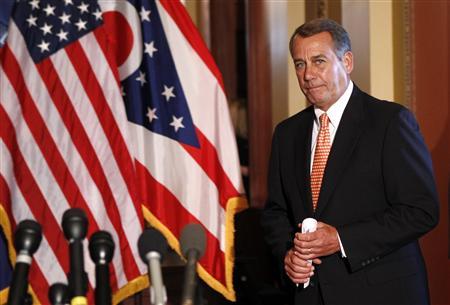Why Boehner Got Real Cuts
 Quin Hillyer writes:
Quin Hillyer writes:
Jim Antle's post below says that most of the cuts in the Continuing Resolution are mere "smoke and mirrors." It's time for me to step up to the plate and explain some budgetary facts of life. I speak from fairly deep knowledge of this stuff. I was press secretary on the payroll of the House Appropriations Committee during the two years (1995-96) during which it cut $50 billion, in actual dollars, from domestic discretionary spending, back when that was a MUCH larger percentage of the overall domestic discretionary pie. In other words, those were MAJOR cuts, and they paved the way directly for the budget balance, and even surplus, that occurred later in the decade. During those two years, I (for obvious reasons) learned how this process works.
Anyway, yes, the cuts are not of the high quality of cuts we might like. Yes, there are a few which can only be characterized as smoke and mirrors. But no, the bulk of these cuts are not meaningless; most of them actually will keep money from being spent that otherwise would, yes, be spent. In other words, most of the complaints are groundless.
Here's why. This is an Appropriations bill. Approps bills are primarily expressed through "budget authority," not through "outlays." A project in an Approps bill that receives budget authority in FY 2011 might not actually get spent -- there may not be an "outlay" of the full amount -- in 2011. If it is a construction project, that will almost certainly be the case. This late in the fiscal year -- which began last October 1, and thus is more than halfway over -- some of these projects may not even get the contracts signed before the end of the fiscal year. So cutting that project would not cut a single dollar from actual spending this year. But that does NOT -- NOT NOT NOT NOT NOT -- mean that cutting the project is a waste of time. If the budget authority is removed, it means that the money that absolutely would have been spent in future years now CANNOT be spent, by law. It saves real money.
It's not a perfect analogy, but think about what happens if you re-finance a $300,000 house to cut the interest rate from 5% to 4.5%. In the first year, it saves almost no money, because you must pay a refinancing fee (and because, of course, it's only one year of a 30-year mortgage). Does that mean that refinancing is useless? Of course not. Over the life of the mortgage, it will save tens of thousands of dollars. The first-year "outlay" might be nearly the same, but what matters is the long-term budget authority: the full payout of the mortgage. The savings are real. It's the same thing with a lot of the items that critics are calling "smoke and mirrors" just because they don't cut this year's outlays. The criticism is utterly ill-informed and baseless.
Granted, there also are accounts that contain leftover money that supposedly wasn't going to be spent anyway -- so in this case, say the critics, cutting the budget authority doesn't save money; it's just forcing the official accounting to catch up with the reality of the unspent funds..... Well, yes and no. Or rather, maybe. The dirty little secret about unobligated funds is that many of them are in accounts that aren't impressively tight. Executive branch bureaucracies, without approval of Congress, often can tap into those funds (in effect) for other purposes, merely by shifting them among accounts. Most funds are fungible. That's why Sen. Tom Coburn is making such a big deal, overall (apart from this battle), about cutting hundreds of billions in unobligated funds: because as long as they remain on the books, they still can get spent, and in most cases will get spent. Therefore, eliminating the budget authority for these programs does indeed save real money. It's not just an accounting trick. It takes away all legal authority to spend that money. It means the taxpayers will not be on the hook for the money.
Click here to read more.

